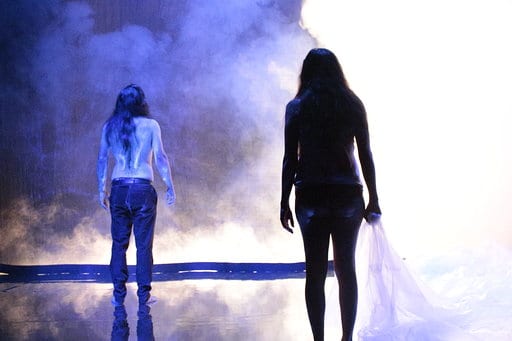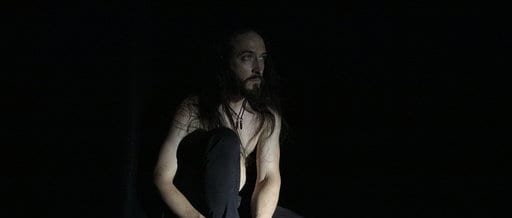Before entering the Gilgamesh Belleville, I was very much looking forward to discovering this very current play written by Alexandra Badea: Burnout. It deals with the gradual descent into hell of a dynamic young leader who repeats relentlessly: “I deserve it. I work more and I deserve more,” before falling into depression. At the core of very contemporary problems, it evokes the race for performance, illusory pursuit of happiness in enterprise, questionable managing methods, hypocrite speeches of the hierarchy who turns a blind eye to employees’ suffering… This text is definitely a wake-up call in our capitalistic world where each of us always have to work more to earn more.
The staging is at the beginning noticeably absent. But it can be understood as a sake of efficiency – no need of a complicated staging, considering the power of Badea’s text. It perfectly fits with the statements of the play, even if such a political text should have deserve a boldest staging. But, despite the great energy of the actors, I quickly got bored. The director uses and abuses devices already seen: a stage hardly empty, perhaps representing a mental (or an open?) space, the cacophony and confusion created by the two actors talking at the same time faster and faster, and mostly the smoke spreading on stage (apparently the stage device to adopt this season!).
At the very end of the performance, the staging becomes hardly incomprehensible. The text has been finished for many minutes, and the actors are showing us some lighting effects. It is for sure beautiful, but is it really linked to the play itself, supposed to deal with this harsh question of burnout? I tried to find in it a metaphor of instability and then relief, if not depression and then rebirth. But, to me, this incomprehensible end just weakens the powerful words of Badea.

Summary in French:
A travers Burnout, Alexandra Badea retrace le parcours d’une jeune cadre dynamique, des prémisses de sa dépression à son diagnostic de burnout. Ce texte éminemment actuel et politique dénonce les méthodes de management abusives, la course à la performance, l’hypocrisie d’une hiérarchie qui ferme les yeux sur la souffrance de ses employés… et autres joies de notre système capitaliste. Malheureusement, la mise en scène proposée par Marie Denys nous fait perdre de vue les enjeux de la pièce. Entre utilisations de procédés vus et revus et fin quasi incompréhensible, le texte de Badea est considérablement affaibli.

